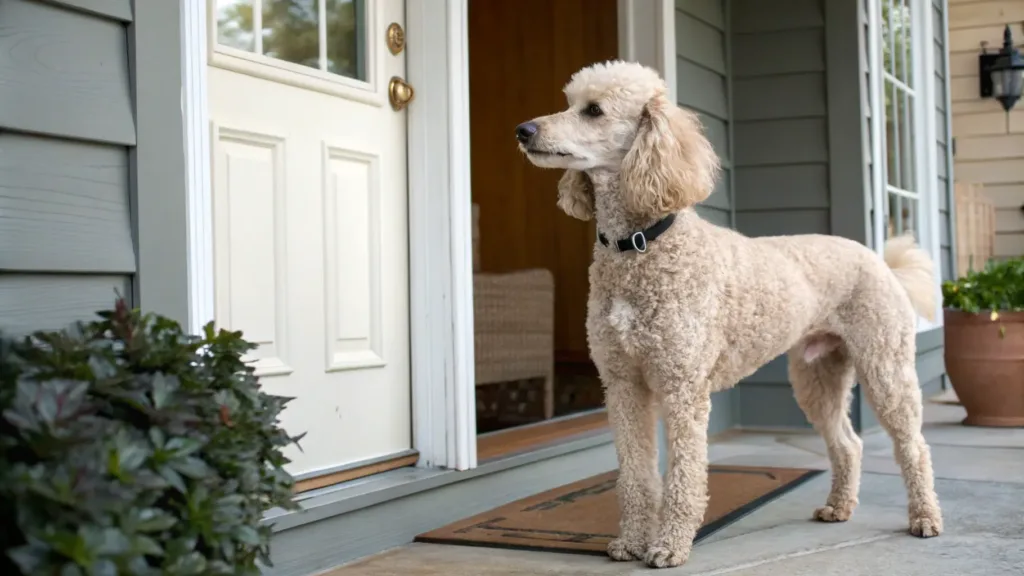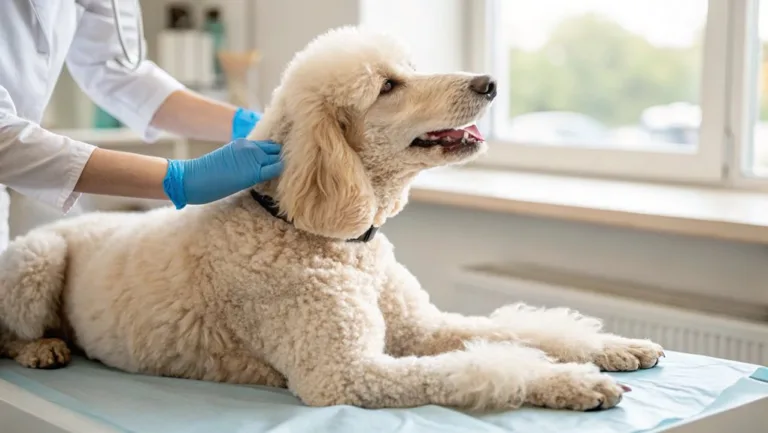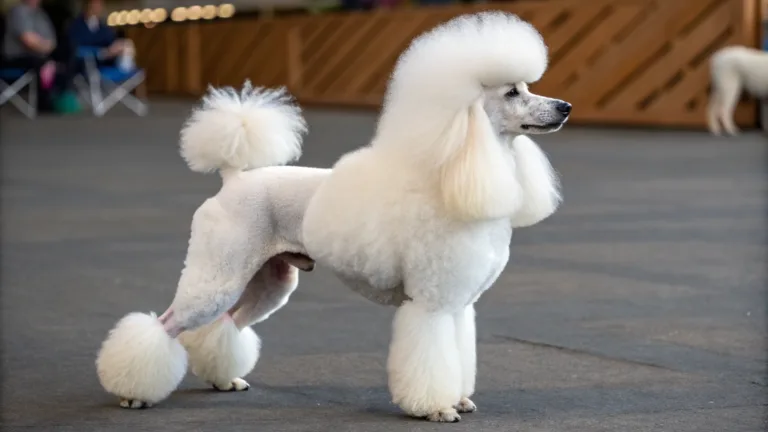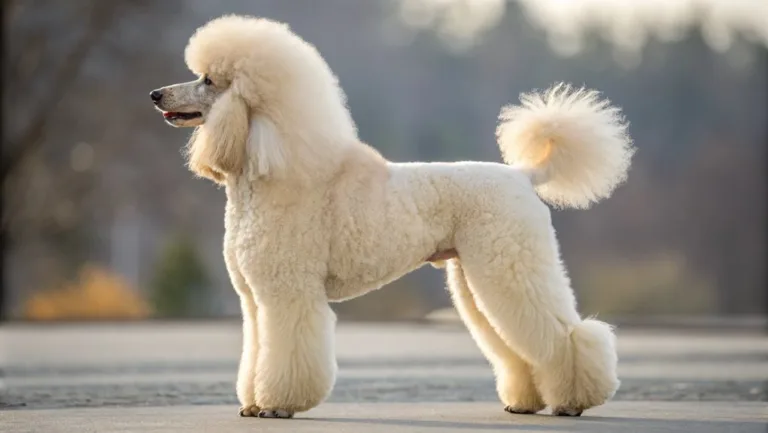Are Poodles Protective Dogs?

You’ll find that Poodles make naturally protective and loyal guardians for your family. These intelligent dogs possess keen instincts that help them detect potential threats through sounds and movements.
They’ll alert you with distinctive barking patterns and position themselves between you and unfamiliar situations.
Don’t let their elegant appearance fool you – Poodles have the courage and dedication to defend their loved ones when needed.
With proper training and socialization starting in puppyhood, you can develop their protective instincts while maintaining their friendly nature.
Understanding your Poodle’s protective traits will help you nurture a well-balanced family guardian.
Natural Protective Instincts

Three key instincts make poodles naturally protective companions. First, they possess an innate alertness that enables them to detect unusual sounds, movements, or strangers approaching your property.
Your standard poodle will alert their owners through distinctive barking or body language when they sense something’s amiss.
Second, poodles demonstrate remarkable adaptability in their protective nature. They can quickly assess situations and adjust their protective behavior based on the perceived threat level.
Through proper training and socialization, you’ll find your poodle can distinguish between welcome guests and potential threats, responding appropriately to each scenario.
Lastly, poodles exhibit strong protective instincts toward their family members, particularly children. You’ll notice your poodle positioning themselves between perceived threats and family members, showing their natural guarding tendencies.
While they’re not typically aggressive, they won’t hesitate to defend their loved ones when necessary. These instincts, combined with their intelligence and loyalty, make poodles effective watchdogs.
However, it’s crucial to channel these natural protective traits through consistent training to guarantee balanced and appropriate responses to various situations.
Training For Protection

Effective protection training for poodles begins during their early development stages, typically between 6-12 months of age.
You’ll need to focus on consistent socialization and positive reinforcement to develop their natural protective instincts while maintaining their friendly demeanor.
Start by teaching basic obedience commands, which serve as the foundation for more advanced protection work. Unlike traditional guard dog breeds, poodles require a balanced approach that emphasizes their intelligent nature.
You’ll want to expose them to various environments, people, and situations while rewarding calm, alert behavior.
During training sessions, incorporate exercises that build confidence and judgment skills. You can practice controlled scenarios where your poodle learns to distinguish between friendly visitors and potential threats.
Remember that poodles aren’t naturally aggressive like some protective dog breeds, so focus on developing their alerting abilities rather than aggressive responses.
Keep training sessions short but regular, and always reward your poodle’s appropriate protective behaviors.
If you’re serious about protection training, consider working with a professional trainer who understands both the breed’s characteristics and proper protection work techniques.
Signs of Protective Behavior

Recognizable signs of protective behavior in poodles include alert barking, positioning between owners and perceived threats, raised hackles, and intense staring at unfamiliar people or objects.
You’ll notice your poodle’s protective behavior through their heightened alertness when someone approaches your home or family.
These smart dogs will often bark with different tones – a deeper, more serious bark for potential threats versus their playful bark.
When they’re in watchdog mode, they’ll maintain eye contact with suspicious individuals and may even show their teeth or growl.
Your poodle’s loyalty shows in how they’ll shadow you more closely when they sense something’s wrong. They may become more territorial, patrolling your property’s perimeter or specific areas of your home.
Their body language will change too – they’ll stand taller, with ears forward and tail raised, displaying typical guard dog postures.
Through proper training, you can enhance these natural protective instincts while preventing overprotective behavior.
Watch for signs of excessive protective behavior, like aggression towards friendly visitors or constant anxiety, as these may require professional intervention to maintain a balanced temperament.
Family Bonds and Loyalty
A poodle’s heart belongs first and foremost to their family, forming deep emotional connections that fuel their protective instincts.
You’ll find that these intelligent family dogs develop fierce loyalty through daily interactions, shared experiences, and consistent care.
Their protective behavior often stems from this deep-rooted devotion rather than an innate guarding instinct.
When you invest time in proper socialization and training, you’ll cultivate a poodle that’s not only protective but also well-balanced.
Their high intelligence makes them highly trainable, allowing you to shape their protective tendencies into appropriate responses.
They’re particularly good with kids, often positioning themselves as gentle guardians while maintaining a watchful eye over their young family members.
Your poodle’s loyalty will show in subtle ways – from following you from room to room to placing themselves between you and perceived threats.
While they won’t typically show aggression, they’ll alert you to unusual situations and remain steadfast in their dedication to keeping their family safe.
This combination of intelligence, loyalty, and protective instincts makes poodles reliable family protectors.
Myths About Poodle Protection

While poodles excel at family protection through their loyalty, many misconceptions cloud people’s understanding of their protective abilities.
You’ll often hear that poodles are known for being too friendly to guard effectively, but this overlooks their natural alertness and capacity for protective behavior.
Through proper training and management, these intelligent dogs can develop impressive guarding capabilities while maintaining their friendly demeanor.
Common myths about poodle protection include:
- The belief that their elegant appearance makes them ineffective guardians
- The assumption that they’re too social to be protective
- The misconception that they lack the courage to confront threats
Don’t let these stereotypes fool you. With appropriate socialization and training, poodles can become exceptional watchdogs.
Their high intelligence allows them to distinguish between genuine threats and normal activities, making them reliable protectors.
You’ll find that poodles combine their natural alertness with strong family bonds to create an effective security system.
While they may not match the intimidation factor of traditional guard dogs, their protective instincts and quick thinking make them valuable defenders of their homes and families.
Conclusion
Like vigilant guardians in elegant coats, poodles will naturally step up to protect their beloved family members. You’ll find their protective instincts shine through their alert barking, watchful nature, and unwavering loyalty.
Whether you choose a Standard, Miniature, or Toy variety, you’ll discover that with proper training and socialization, your poodle will become a devoted protector who balances affection with natural protective qualities.






